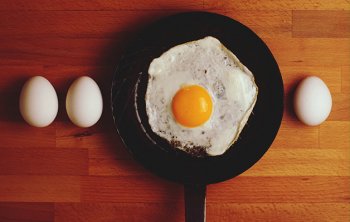
 What and when you should eat is crucial for building bigger muscles
What and when you should eat is crucial for building bigger muscles
Part 1: How much
A 2007 study in the Journal of Applied Physiology found that muscle size increases 0.2 percent per day during the first 20 days of a strength-training program. That growth is over and above the high rate of muscle-protein breakdown that’s occurring simultaneously.
This explains why the guy who’s just starting out, or returning from a layoff, needs more protein than the weight-room warrior who’s been training for years without a break – and who is at or near his genetic ceiling for strength and size. But it’s the beginner who’s least likely to worry about his diet and most at risk of not getting as much protein as he needs.
How much is that? A good target is 1.6g of protein per kilo of body weight per day. For a guy who weighs 80kg, a day’s worth would be about 130g.
Part 2: How often
Protein synthesis is the process that takes the protein from food and turns it into muscle tissue. As Dr. Mike Roussell explains, protein synthesis is like a lamp. It’s either on or off. With 20-to-25g of high-quality protein, it’s on. More protein won’t improve the response, just as applying more force to a light switch can’t make the room brighter.
Here’s why it matters:
Most of us tend to backload our daily protein intake. We’ll have a low-protein, high-carb breakfast (a bowl of cereal with milk), a moderate-protein lunch (a turkey sandwich), and a high-protein dinner, featuring a large piece of meat or fish. But a 2014 study in the Journal of Nutrition showed that you turn more of the protein from your meals into muscle tissue when you distribute protein evenly at each meal.
In the study, protein synthesis was 25 percent higher in subjects who ate 30g of protein in each of three daily meals, compared to those who ate the same total amount but had most of it at dinner.
Getting the most out of your protein involes distributing your intake across breakfast, lunch and dinner - eggs in the morning is a good start.
A recent study in the Journal of Applied Physiology found that subjects who got at least 20g of protein six times a day lost body fat and increased lean mass, with or without training. They were given a protein supplement within an hour of waking up, no more than two hours before going to bed, and every three hours in between.
Six meals may be excessive. But you probably want at least three protein-rich meals a day, especially in the early stages of a new training program. Protein synthesis will peak about 16 hours post-workout, and will remain elevated for up to 48 hours. Protein breakdown will also be higher for 24 hours.
 What this means for you is that every meal counts. If you’re working out three or four times a week, your body will in effect be in the process of building new muscle every hour of every day, and also breaking down muscle at a higher rate at least half the time.
What this means for you is that every meal counts. If you’re working out three or four times a week, your body will in effect be in the process of building new muscle every hour of every day, and also breaking down muscle at a higher rate at least half the time.
Part 3: Pre- and post-workout
For consistent, long-term lifters, protein synthesis will peak much earlier – about four hours post-workout – and return to baseline levels faster. So the protein you eat immediately before and after your workout becomes more important.
In a 2012 study in the American Journal of Clinical Nutrition, the researchers compiled data from multiple studies looking at protein and strength training. They found that those who used protein supplements gained an extra kilo of muscle over 12 weeks, compared to those who didn’t. For experienced lifters, they concluded that pre- and/or post-workout protein supplements are required to achieve maximum results.
The “window of opportunity, ” when your muscles are most receptive to protein, appears to be about four to six hours, according to a 2013 study in the Journal of the International Society of Sports Nutrition. Ideally, you want a protein-rich meal two to three hours before training, and another within an hour or two after you finish.
Those who work out in the morning before breakfast have a narrower window., according to Dietary Protein and Resistance Exercise. So if you work out before eating, you want a post-workout meal as soon as possible.
Part 4: Best protein sources
Different types of food contain different combinations of amino acids – the building blocks of protein. Leucine is by far the most important of the 20 amino acids for creating muscle. It takes an estimated 2g-to-3g of leucine to get the maximum anabolic effect from a meal.
Just about any normal-size serving of meat or poultry will contain at least 2g of leucine (that's roughly the size of your palm.) Three eggs, two glasses of milk, a piece of fish, or a cup of yogurt will give you about 1.5 grams. A cup of cottage cheese or scoop of whey protein (25 grams) will give you close to 3 grams.
Among plant foods, soy has the most leucine. A cup of soybeans has 2.3 grams. Beans and lentils are the next-best sources, with 1.2 to 1.4 grams per cup. A quarter-cup serving of nuts or flaxseeds will have about 0.5 grams.
INTERESTING VIDEO












